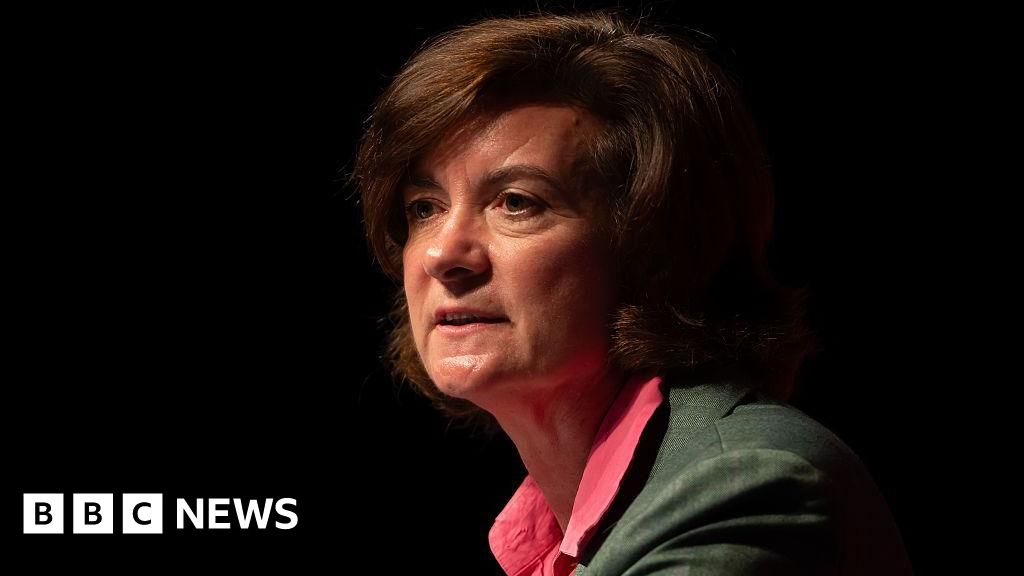Wales' first minister has called for the wealthiest to be taxed more as the Treasury considers how to deal with the fallout of the Commons welfare rebellion. Labour pulled back from significant cuts to disability benefit on Tuesday as government ministers feared a humiliating defeat. It has led to speculation thattaxes will have to riseafter potential savings of £5bn were either delayed or entirely lost. Morgan told BBC Wales that the chancellor Rachel Reeves is "trying to fill a £20bn black hole that was left by the Conservatives". "There is a price to pay for that. The question is who is going to pay that price? "You've got to get the balance right. Personally I think the people with the broader shoulders should be asked to carry more of the burden." She appeared to be talking about the UK government, rather than the Welsh government's own tax powers. Morgan said she had no idea what the reason was for the Chancellor Rachel Reeves' tears in the Commons on Wednesday. "What I do know is that politicians are under immense pressure all the time," she said. The first minister was asked if she thought the chancellor's position was tenable and whether she should remain in post. She did not give an answer directly, but said: "I think it is clear that the markets... are giving a signal which is, look, actually they have confidence in her." In an interview on Thursday, Reeves said she had been dealing with a "personal issue" and had a "tough day". Ministers in the Welsh governmentwere among the voices in the Labour partythat had lobbied against the welfare changes. The planned cuts to disability benefit have now been delayed to the outcome of a review. The first minister said she was "glad the UK Labour party has listened to the concerns of people who were really worried about how the changes might have impacted them". Meanwhile on Thursday, Plaid Cymru MP Ann Davies and MS Sioned Williams called again for a Wales-specific impact assessment on the delayed changes to personal independence payments (PIP) and the still planned cuts to the health element of universal credit. They said people across Wales were "confused and frustrated". "People need transparency and certainty about how these changes will affect their lives." The first minister also responded to a watchdog report which found she failed to declare in the proceedings of the Welsh Parliament that she hadreceived money from a trade union. Morgan said she had "declared an interest in writing" which had been on the record "for a long time". "In the heat of the moment, sometimes you forget to declare an interest orally in the chamber," she said, adding she would "take on board the comments of the commissioner". Morgan was taking part Ireland-Wales forum with the Irish foreign minister Simon Harris in Swansea on Thursday. The Welsh government has signed a fresh collaboration agreement with Ireland, setting out how the two countries will collaborate on the economy, climate change, culture and a range of other issues. It follows from a previous agreement signed in Cardiff in 2021. Morgan said: "We've got a renewal of a relationship with Ireland. We've had a five year partnership, and we're opening the next chapter."
Tax the wealthy, FM says after welfare rebellion
TruthLens AI Suggested Headline:
"Wales' First Minister Calls for Increased Taxation on Wealthy Amid Welfare Reform Backlash"
TruthLens AI Summary
Wales' First Minister, Mark Drakeford, has advocated for increased taxation on the wealthiest individuals in response to the recent turmoil surrounding welfare reforms in the UK Parliament. The Labour government faced significant backlash after attempting to implement cuts to disability benefits, which led to a rebellion among its members. As a result, the government has delayed the proposed £5 billion in savings, raising concerns about how to address a projected £20 billion shortfall left by the previous Conservative administration. Drakeford emphasized the need for those with the greatest financial means to contribute more to alleviate the burden on the less fortunate. His comments suggest that the responsibility for filling this fiscal gap should not fall solely on the shoulders of the vulnerable populations but rather on the wealthier segments of society.
In addition to discussing tax policy, Drakeford addressed the political climate surrounding Chancellor Rachel Reeves, who has faced scrutiny and emotional moments in Parliament. The First Minister expressed concern over the pressures faced by politicians but refrained from directly commenting on Reeves' future in her role. Meanwhile, the Welsh government has been vocal in opposing the welfare cuts, with calls for a Wales-specific assessment of the impacts of these changes on disability benefits and universal credit. The delay in implementing cuts has been welcomed by Drakeford, who acknowledged the UK Labour Party's responsiveness to public anxiety regarding these reforms. Additionally, he responded to criticism about his failure to declare a financial interest during parliamentary proceedings, stating that he had previously disclosed this information in writing. On a more positive note, Drakeford participated in the Ireland-Wales forum, announcing a renewed collaboration agreement with Ireland that focuses on various sectors, including the economy and climate change, thereby strengthening ties between the two nations.
TruthLens AI Analysis
You need to be a member to generate the AI analysis for this article.
Log In to Generate AnalysisNot a member yet? Register for free.
